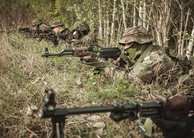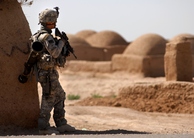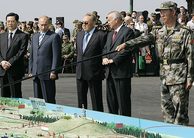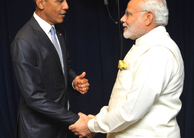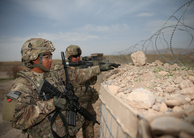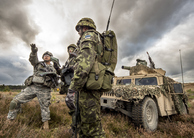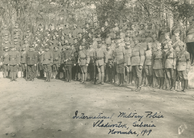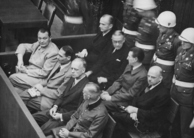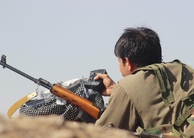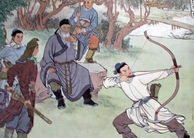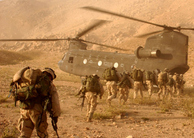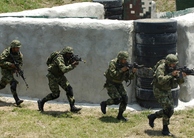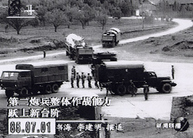|
Military (tagged articles)
The keyword Military is tagged in the following 23 articles.
2017, Vol. 9 No. 11
A subset of Alexandrian scholarship which has garnered long-held fascination does not center upon a success, but rather a failure: that is, the divide in his court which emerged during his Asiatic campaigns. Such a divide, though incited by a number... Read Article »
2017, Vol. 10 No. 2
It is often thought that great Military strategists do not engage in simple, frontal assaults, but instead devise complex plans meant to deceive, manipulate, and surprise their enemies. However, do such strategies always lead to victory? If not,... Read Article »
2017, Vol. 9 No. 03
World War II ranks among the deadliest Military conflicts in history. From 1939-1945, the estimated number of casualties worldwide exceeded 60 million.[1] The United States suffered Military fatalities in excess of four hundred thousand, and the... Read Article »
2016, Vol. 7 No. 1
The rise of modernized and efficient militaries competing for dominance against the United States' Military has resulted in increased eruptions of conflict globally. A majority of decisions by the Joint Chiefs and EUCOM about long-term U.S. Military... Read Article »
2016, Vol. 10 No. 1
Following the People's Republic of China's "Reform and Opening Up" (gaige kaifang) ushered in by Deng Xiaoping in 1978, China's participation in international organizations has dramatically increased.2 These organizations cover a range of issues... Read Article »
2016, Vol. 9 No. 1
Starting with a high profile push through the region in 2011, the Obama Administration has made the "Pivot to Asia" a central part of American foreign policy. Enlisting regional partners who share strategic interests will be critical to ensuring... Read Article »
2015, Vol. 2015/2016 No. 1
In 1999, The New York Times Magazine ran a cover story which asked: Does “being a good soldier [depend] on being an aggressive male?” “Is there something uniquely male about the warrior? Can the warrior survive the feminisation... Read Article »
2014, Vol. 4 No. 2
The North American Treaty Organization (NATO) was founded at the outset of the Cold War and served as a collective defense alliance of states in North America and Western Europe against the Soviet bloc. However, following the end of the Cold War... Read Article »
2014, Vol. 6 No. 04
In 1914 Russia was a powerful empire. It constituted a fundamental part of the European balance of power. However, years of bloody and costly war changed the nation by bringing to boil all the inequities and discontent built up under the Tsarist... Read Article »
2014, Vol. 7 No. 2
The creation of the Nuremberg Court following World War II exemplified international cooperation, particularly between the Great Powers: the United States, France, the Soviet Union, and Great Britain. Expounding the benefits of justice and the rule... Read Article »
2013, Vol. 5 No. 08
After World War II, the United States Military gradually came into a position of overwhelming dominance in the world. Military spending in the United States far outpaces that of other countries, with their world share of Military expenditures at... Read Article »
2013, Vol. 3 No. 1
Given the importance of the global defense trade to geopolitics, the global economy, and international relations at large, this paper examines the political economy of the U.S. defense industry. The goal of this study is to determine the extent... Read Article »
2012, Vol. 2 No. 1
The last decade of American Military policy has been dedicated to fighting an enigma – how to wage war against an enemy that does not think, act, or fight like we do; an enemy that wears no uniform, utilizes any tactic, and swears its allegiance... Read Article »
2012, Vol. 4 No. 10
Since his death in 1142 CE, Yue Fei of the Song Dynasty (960-1279) has been revered by the Chinese as a national hero. His skill as a Military leader, bravery in battle, and Chinese national pride have made him one of the most popular figures in... Read Article »
2012, Vol. 4 No. 09
“There are in Europe many good generals, but they see too many things at once; as for me I see only one thing, namely the enemy’s main body. And I try to crush it, confident that secondary matters will settle themselves” - Napoleon... Read Article »
2011, Vol. 5 No. 1
When should the United States intervene militarily in weak countries? This is a topic of pressing international concern because the United States keeps intervening in weak countries. We are currently involved indirectly in Libya and very deeply... Read Article »
2011, Vol. 5 No. 1
The US has increasingly turned to using the Military to administer humanitarian aid in recent years. This process has come under attack from many academics and foreign officials. Using action in Colombia from 1999 to present as a case study, this... Read Article »
2011, Vol. 3 No. 05
Insurgency is not a new phenomenon for the United States, in fact by definition the American's built an insurgency during the Revolutionary War. But it was not until the Vietnam War that America faced an insurgency that it could not defeat. Because... Read Article »
2010, Vol. 3 No. 2
On the 60th anniversary of the North Atlantic Treaty Organization's founding, Afghanistan provides a unique opportunity for the alliance to prove its strength beyond Europe and combat global security threats from terrorism and instability.2 But... Read Article »
2009, Vol. 1 No. 11
In her book, Maneuvers: The International Politics of Militarizing Women’s Lives (2000), Cynthia Enloe examines the role militarization plays in women’s lives. Enloe defines militarization as “a step-by-step process by which a... Read Article »
2009, Vol. 1 No. 10
“News is something someone wants suppressed,” British newspaper baron Lord Northcliffe once said. “Everything else is just advertising.” This point is especially true in war journalism where every story, be it a heart-warming... Read Article »
2009, Vol. 2 No. 2
Is America really in decline as a global superpower? We examine current arguments for America's economic decline and argue that a purely economic analysis is insufficient for evaluating a country's status as a global superpower. Our comprehensive... Read Article »
2000, Vol. 1999/2000 No. 1
In order to understand why China has been recognised as a potential 21st Century superpower, it is necessary to understand what the term “superpower” encompasses. Domination of the world economy is arguably a key factor, as is internal... Read Article »
Expedited Article Review
Submit an article and get a decision fast.
If you need a fast decision, INQUIRIES Journal offers expedited processing of your submission for a small fee. Depending on the expedited review option you choose, you can receive a decision in as few as 5-days.
In addition to a shorter review period, the fee supports the journal's continued operation and open-access publishing model. Standard submissions are always free. Submit Now » - Submit an Article to Inquiries Journal -
|












